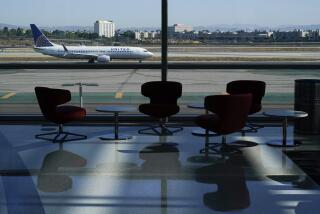United Says It Will Slash LAX Flights
- Share via
After investing heavily over a period of years to become the largest air carrier at Los Angeles International Airport, United Airlines confirmed Monday that it will dramatically reduce its Los Angeles flight schedule at the end of this month.
The flight reductions will leave the airport’s No. 1 carrier with 40% fewer flights than it offered before the Sept. 11 terrorist attacks on the World Trade Center and the Pentagon. The cutbacks mark a major retrenchment for United, which fought for years to become the biggest airline at the world’s third-busiest airport.
Before the terrorist attacks, United carried more than one of every five passengers to and from Los Angeles and employed 8,500 employees at the airport. The latest cutbacks, part of a companywide reduction, could add to the ranks of local pilots, flight crews, ground crews, and maintenance workers facing layoffs.
United’s service at LAX already had been reduced from 178 daily flights before Sept. 11 to 144 departures today. It will drop to 104 flights beginning Oct. 31, said company spokesman Joe Hopkins at the airline’s Chicago headquarters.
“We’re in a fight for our survival plain and simple,” said Alan Wayne, the company’s spokesman in Los Angeles. “So we’re trying to match capacity to demand. The key thing here is that there are fewer frequencies, we can’t deny that. But we’re still operating in all these markets.”
Overall, the airline had flown 2,400 flights a day systemwide before hijacked jetliners were flown into the three targets last month, sowing fear and causing massive passenger reductions on most air carriers. In an initial round of reductions, United cut back to about 1,850 flights. The latest cuts will take the number of departures worldwide down to 1,654 a day.
As United scales back service, it is incurring unexpected costs. The airline said Monday that the end-of-the-month schedule changes mean it will have to change reservations for about 5 million customers.
The cutback at LAX also marks a major retreat in United’s battle to keep Southwest Airlines from dominating the skies over California. United previously announced it is eliminating its Shuttle by United service in the West.
Instead, United Express, a small regional carrier, will take over most of the service from Los Angeles to Oakland, Sacramento and San Jose using smaller, 50-passenger regional jets, instead of Boeing 737s. The smaller planes will pick up about 30 of the flights United plans to drop from its principal schedule.
United, a unit of UAL Corp., joined nearly all the major airlines shortly after the attacks in announcing it would slash operations by 20% or more. The schedule cuts in turn prompted the various carriers to announce they would eliminate 100,000 jobs nationwide.
In the first days after Sept. 11, the airlines’ cash reserves rapidly dwindled because airlines have enormous fixed costs--such as labor and debt payments--that must be paid no matter how few travelers take to the sky. Airlines remain saddled with those expenses, while their revenues are drying up.
The dire situation left the nation’s second-largest airline severely weakened financially, like many other carriers. The industry as a whole is expected to lose $5.5 billion to $10.5 billion in 2001. The crisis also led to the $15-billion federal bailout of the industry, which included $5 billion in direct cash aid.
One major airline, Southwest, essentially has been alone in resisting a massive scale-back.
The maverick low-fare carrier, based in Dallas, last week shaved just a few flights from its most frequently traveled routes. But it has mostly stayed the course and has not eliminated any jobs.
That’s prompted analysts to speculate that Southwest is trying to ride out the industry’s slump while gaining valuable market share, at the expense of retrenching carriers such as United.
“It leaves Southwest in a wonderful position,” said Ron Kuhlmann, vice president of Roberts, Roach & Associates, an aviation consulting firm in Hayward, Calif. Southwest will dominate the market between Los Angeles and Oakland, San Jose and Sacramento.
Kuhlmann said United’s schedule cuts will hurt the market between Southern California and San Francisco. Southwest stopped flying to San Francisco in March because frequent delays disrupted their schedule, which relies on the quick turnaround of aircraft.
The sharp reduction in flights will have an immediate economic effect on LAX and United employees who are based there, although the company said it could not provide exact figures of how many workers will be furloughed.
Layoff notices are being served this week to salaried, management and contract workers. United earlier estimated that total layoffs worldwide would come to 20,000.
Paul Haney, spokesman for the city department that runs the airport, said LAX also will suffer financially from the United cuts. “Fewer passengers means less revenues from parking, retail shop sales and food and beverage concessions,” he said.
Even with the 40% drop in flights and employee layoffs, United will remain the largest carrier at LAX and will continue to serve major destinations in the U.S.
“We’re not by any means abandoning Los Angeles,” spokesman Wayne said. “We’re still a force and will continue to be, and hopefully we’ll be able to rebound in the months and years to come.”
The company’s continuing commitment to LAX is evident in its plans to go forward with the opening this winter of a $35-million cargo facility on Century Boulevard, Wayne said.
But Kuhlmann said the flight reductions paint a more sobering portrait of a company that made a competitive decision to build market share at Los Angeles International. “Obviously,” he said, “it didn’t work.”
*
Times staff writer Jennifer Oldham contributed to this report.
More to Read
Inside the business of entertainment
The Wide Shot brings you news, analysis and insights on everything from streaming wars to production — and what it all means for the future.
You may occasionally receive promotional content from the Los Angeles Times.











